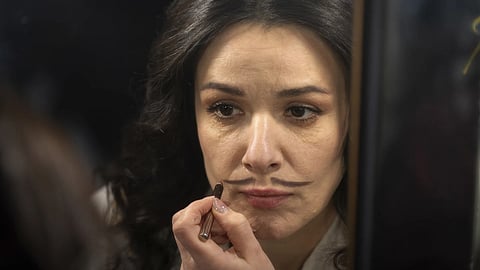
- LIFESTYLE
- FASHION
- FOOD
- ENTERTAINMENT
- EVENTS
- CULTURE
- VIDEOS
- WEB STORIES
- GALLERIES
- GADGETS
- CAR & BIKE
- SOCIETY
- TRAVEL
- NORTH EAST
- INDULGE CONNECT

The stage lights dim, and the audience falls silent as King Lear begins. But in this production, there is something different—every actor on stage is a woman. With so many Ukrainian men now serving in the military, the Chernihiv Regional Youth Theatre has been forced to adapt, casting women in traditionally male roles while continuing to bring art to a war-torn community.
Chernihiv, a city near Ukraine’s northern borders with Russia and Belarus, has been deeply affected by the ongoing war. Since Russia’s full-scale invasion in 2022, many of the theatre’s male actors and stage workers have joined the army. Out of necessity, the theatre has reinvented itself, adapting its repertoire and recasting roles.
“We were rehearsing King Lear when suddenly our men were taken to the front,” said the theatre’s director, Roman Pokrovskyi. “We only had the female part of the troupe left. So we thought, ‘Well, if men played women in Shakespeare’s times, why not give it a try?’”
Since then, the theatre has continued to evolve, with women taking on prominent male roles in productions such as Hetman, a play based on 17th-century Cossack leader Ivan Mazepa. The story of Mazepa, who defied the Russian Empire to side with Sweden, remains strikingly relevant today as Ukraine continues to resist Russian aggression.
Beyond the performances, the women of the theatre play another crucial role—supporting soldiers on the front lines. When they are not on stage, the actors, along with cloakroom attendants, cashiers, and cleaners, gather backstage to weave camouflage nets and raise funds to provide supplies for their colleagues in the military.
“Our actor, Kostiantyn Slobodeniuk, went missing. Our sound operator, Dmytro Pohuliaylo, disappeared in the Pokrovsk direction at the end of 2024,” said Oleksii Bysh, one of the theatre’s few remaining male actors.
Bysh stood beside a framed photograph of their former colleague, sound engineer Vyacheslav Shevtsov, who was killed in a Ukrainian counteroffensive in Kursk in August 2024.
For the remaining performers, the pain of loss is ever-present. “This is pain, the pain of the entire nation, our pain,” said actor Ruslana Ostapko, holding back tears. “But our guys are doing well. We keep our fingers crossed for them. We help.”
Chernihiv’s proximity to Russia has made it a frequent target of missile and drone strikes, damaging homes, infrastructure, and cultural institutions. Yet the theatre refuses to close its doors.
According to Oksana Tunik-Fryz, head of the Arts and Culture Council at the Chernihiv Regional Administration, many of the region’s cultural sites have been destroyed or severely damaged.
“The enemy is destroying us from within by destroying our culture,” she said. “Killing a Ukrainian is killing a person. But destroying our culture means destroying our future.”
Despite the risks, the theatre continues to welcome audiences. Before every performance, an announcement is played to inform the crowd that the show will pause in the event of an air raid. The recording was made by actor Kostiantyn Slobodeniuk, now missing in action.
“We hear his voice before every show,” said theatre director Ihor Tykhomyrov. “When the air raid siren goes off, we move into bomb shelters. It happens at nearly every second performance.”
While war threatens to silence the arts, it has also strengthened the community. “Russian drone strikes are a problem, a serious problem,” Tykhomyrov admitted. “But there’s an interesting thing—it brings people together.”
The theatre has become a symbol of resilience, with performances bringing moments of normalcy and hope to audiences in the face of uncertainty.
Reflecting on the theatre’s perseverance, Bysh quoted Soviet-era Ukrainian filmmaker Oleksandr Dovzhenko: “We are a small theatre. But, as Dovzhenko said, you are only small from afar. Up close, you are large.”